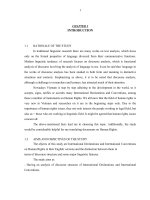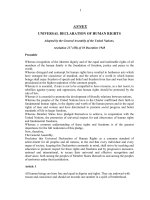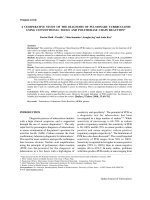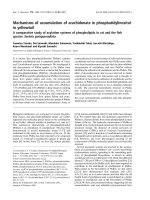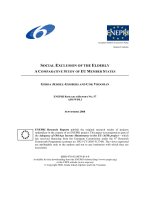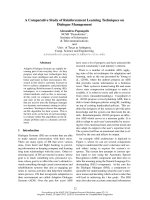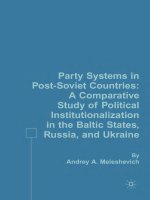Excursions on the way a comparative study of wang bis laozi and john finnis new classical natural law theory with special attention to the relations between metaphysical speculation and political theorizing
Bạn đang xem bản rút gọn của tài liệu. Xem và tải ngay bản đầy đủ của tài liệu tại đây (1.38 MB, 335 trang )
EXCURSIONS ON THE WAY:
A COMPARATIVE STUDY OF WANG BI’S LAOZI AND JOHN FINNIS’
NEW CLASSICAL NATURAL LAW THEORY WITH SPECIAL ATTENTION
TO THE RELATIONS BETWEEN METAPHYSICAL SPECULATION AND
POLITICAL THEORIZING
JUDE CHUA SOO MENG
(B.A.(Hons.), M.A., NUS)
A THESIS SUBMITTED
FOR THE DEGREE OF DOCTOR OF PHILOSOPHY
THE DEPARTMENT OF PHILOSOPHY
NATIONAL UNIVERSITY OF SINGAPORE
2005
i
Acknowledgements
This thesis would not have been without my teachers. Professor Alan K L Chan
kindly supervised the completion of the thesis, read the draft and commented on it.
His competent direction and caring assistance saved me from several serious pitfalls. I
had also benefited from his graduate seminars on xuan xue Daoism and on Wang Bi. I
had the good fortune of having two of H L A Hart’s own students as my teachers teach
me jurisprudence. Professor C L Ten handed me the rudiments of Hart’s The Concept
of Law. My own grasp of practical reasoning and jurisprudential natural law theory
owes most to John Finnis, unquestionably the world’s leading natural law theorist. I
am grateful to Professor Finnis who, while he was at Notre Dame, weekly discussed
Natural Law and Natural Rights with me. I have also benefited from his lectures on
his Aquinas and from the papers he sent me.
His constant encouragement and
mentoring care adds to my debt beyond the gift of his thought.
However in
developing my own philosophical conclusions I may go beyond what Finnis says. The
point is, where infelicities exist, they should always be attributed to me.
My thanks are to National University of Singapore for its generous awards of
the doctoral scholarship and the president’s graduate fellowships. These muffled the
distraction of financial concerns to a very great extent. My year as a visiting graduate
fellow at the Center for Philosophy of Religion at the University of Notre Dame in
2003 enabled sustained reading, thinking and writing on the connection between
natural law and metaphysics. My debts are to Thomas P Flint, its valiant director, for
the opportunity. During that time, Alvin Plantinga’s subtle ideas found their way into
i
ii
my own musings on the connection between metaphysical supernaturalism and ethics.
My subsequent election in 2003 as a Fellow of the Royal Asiatic Society of Great
Britain and Ireland was a great source of encouragement.
Parts of chapter 4 was read at the Annual Natural Law conference on “Law’s
Moral Foundations” held at the University of Notre Dame, IN, USA where John
Finnis debated prominent legal positivists such as Joseph Raz, Brian Leiter, Matthew
Kramer and Timothy Endicott. Parts of chapters 2 and 7 were published in separate
papers in the Journal of Chinese Philosophy. Aspects of Chapter 8 were published in
Maritain Studies and was read at the 3rd International Convention for Asian Scholars
in Singapore.
Last but not least, my thanks are to my family members, especially my Dad
and my Mom. Their kindness and caring add to my debts to them. Also my friends in
Singapore and Notre Dame and colleagues have been a constant source of
encouragement and stimulation. Most importantly, my thanks and love go out to my
wife, Amelia Tham, whose stability, patience and loving care make for the right
conditions so necessary to think deeply into important matters, much as she hurries me
along. Perhaps one day, my work may benefit her in ways she so deserves beyond its
mere completion.
ii
iii
Table of Contents
Acknowledgements
i
Table Contents
iii
Summary
iv
Section One: The Non-deducibility of Political Precepts from Metaphysics
1
Chapter 1: John Finnis’ New Classical Natural Law Theory
2
Chapter 2: Sagely Politics as Modeling of the Dao in Wang Bi’s Laozi
14
Section Two: Deducing the Dao/God as the Source of the Desired Society
47
Chapter 3: Tracing the Dao in Wang Bi’s Laozi
48
Chapter 4: Choosing a Focal Concept of Law
108
Chapter 5: Law’s Reasonable Foundations
118
Chapter 6: From Reasons to Metaphysical Supernaturalism
142
Chapter 7: Nameless Dao and Unlimited Being
182
Section Three: Similarities and Differences in Political Strategies
218
Chapter 8: What Not To Do: Against Moral Legalism and Religious Coercion
219
Chapter 9: What Can Be Done: Minimizing Desires and Developing Reasons
Section Four: A Final Place for Metaphysics
263
Chapter 10: Forgetting the Trap Once the Rabbit is Caught: The (Ir)relevance 297
of the metaphysics of the Dao/God
298
Epilogue
Selected Bibliography
318
Chinese Glossary
320
325
iii
iv
Summary
In this thesis I study the place metaphysical speculation of the Dao or of God
has in the political and social theorizing of two great philosophical traditions as
developed by its respective scholars and commentators: Aquinas’ Natural Law Theory
as defended by the New Classical Natural Law Theorists (especially John Finnis), and
Wang Bi’s commentarial reading of the Laozi or Dao de Jing.
Finnis’ recent refreshing interpretation of Aquinas’s natural law theory offers a
coherent and compelling reading of the thomistic texts. Because Finnis recasts
Aquinas’ ideas in the clear and lucid structures of analytic philosophy, natural law
theory is able both to defend itself well against unwarranted criticism, develop itself
with critical self-reflection and engage other influential (analytic) philosophies in
order to further stretch its philosophical limits. Its potential as a credible and stable
philosophical system that is at the same time open is not just immense, but has also
been actualized to a great extent. While Lee Yearly’s Mencius and Aquinas does
mention natural law theory in passing, to date the new classical natural law theory has
not seriously engaged Chinese philosophy. My thesis is a first attempt to push the
frontiers of the new classical natural law theory in the direction of the oriental east.
I have chosen to compare natural law theory with the Laozi because amongst
the many Chinese philosophical traditions it is one of those that maintains there are
some natural moral norms. More importantly like Aquinas, it seems to have a strong
metaphysical component. Its speculation on the Dao as the origin and source of the
iv
v
myriad things suggests that it has a conception of a creator, even if impersonal. Not
surprisingly the reason the Jesuits gave for translating the Laozi into its first western
Latin version, submitted to the British Royal Society in 1788, was to show that the
ancient Chinese knew of the mysteries of the Trinity and the Incarnate God. I have
chosen to focus on Wang Bi’s interpretation of the Laozi because like Aquinas’
Thomism, Wang Bi’s reading of the Laozi has a strong critical and speculative
element, as opposed to other readings that reduce the text to religion. Set in the WeiChin period where scholars practiced ching-tan (free/pure discussion/talking), Wang
Bi did not hesitate to tease out and develop critically the logical connections and
implications of the Laozi text, especially when it comes to speculating about the Dao
and its political insights. For this reason Wang is often credited as one of the pioneers
of the Profound Studies movement (xuan xue). Through this comparative study, we
may better see how classical natural law theory sits with an influential school of
thought in the (Neo) Daoist tradition.
(After that, perhaps we may continue to
research its compatibility with other Chinese traditions).
Because the connection between metaphysics and political theory is often not
clear, this study hopes also to illuminate the relation between them. For some time
metaphysics was thought to have been a basis for natural law theorizing but Finnis has
argued that this is not so. Since Wang’s Laozi has much to say on the Dao and the
modeling of the Dao, is metaphysical research also some form of premise for political
theorizing? What else, if any, is the place of metaphysical research for the political
theorist in both traditions? These questions are an important focus of our thesis.
v
vi
I begin my comparative study with the argument in Section I that both
traditions do not develop metaphysical claims in order to infer political strategies.
Rather the reverse is true, though in rather different ways. Thus Section II: Natural
Law starts with self-evident precepts and moves towards a metaphysics of God,
whereas Wang’s Laozi begins with a study of human behavior, develops political
conclusions and integrates metaphysical claims of the Dao with the political doctrine
of non-intervention through a clever play of literary metaphors, and offers an
“inferential trace” to the Dao as the ultimate origin or source of the desired community
and of words and names. I will include an analysis of the strong similarities between
the metaphysics of the Dao and the thomistic metaphysical doctrine of God.
Further under Section III, I will suggest how although both traditions share
similar negative strategies informed by their appreciation of the limits of the use of
coercion to create the desired society, there remain differences when it comes to
applying positive strategies. These differences are not the result of metaphysical
premises of God or the Dao, but are the result of different theories of what constitutes
authentic moral action.
Finally, Section IV will explain how metaphysics re-enters in the natural law
theorists’ political theorizing: by attending to the realization that practically reasonable
political action is an analogous likening and fulfillment of God’s very own Normative
Being and Will, the natural law political theorist has a new motivation to act
reasonably in politics: to imitate God. This however, does not feature very much in
vi
vii
Wang’s Laozi, which seems to recommend that the metaphysics of the Dao be
forgotten once the central political doctrine is grasped.
The purpose of this study is to compare two prominent and influential
philosophical traditions which have a strong metaphysical component. My hope is that
such an “excursion on the Way (Dao)” would be useful for scholars, especially my
fellow natural law theorists, friends and colleagues, as well as those fellow scholars of
the Daoist tradition, when each attempts to dialogue with the other in this age of
globalization wherein the East daily meets the West, and vice versa.
Just as well, readers from outside these two traditions will find interesting the
very different approaches with which these two traditions see the role and place
metaphysics has for political theorizing. These ideas can help inform their own
political theorizing. In particular, policy makers in the political arena will be alerted
to the practical implications which metaphysical propositions (whether positive or
negative) may have on the construction of the desired society. These connections are
largely captured in Section II of this thesis. Equally interesting would be Section III,
which lays out the efficacies of different policies in the construction of the desired
society.
Finally politicians and policy makers with a religious bent will much
appreciate Section IV, and there find inspiration for reinterpreting their vocation of
good governance as a participation of a greater nobility.
I would not be so bold as to say that this study or thesis has covered all
grounds, and there remains much room for further research. Still I believe that I have
vii
viii
addressed the more prominent issues relevant to the contemplation of the relation
between metaphysics, ethics and politics in these two great traditions.
viii
1
I
The Non-deducibility of Political Precepts from Metaphysics
1
2
Chapter 1
The Non-Derivation of Ethics and Politics From Metaphysics In John Finnis
Introduction
In this opening chapter I will lay out the basis of the ethical and political theory of
John Finnis’ New Classical Natural Law Theory. I show that in Finnis, ethical and
political precepts are not derived or inferred from (a) metaphysics (of God). I also
argue that Finnis’ interpretation is largely consistent with the traditional concerns and
assumptions concerning the philosophical connection between ethics and human
nature. In Finnis, saying that we do not derive the first principles of natural law from
metaphysics or from a theory of human nature does not commit us to the position that
the natural law is independent of human nature or metaphysics, or that these are
irrelevant.1
John Finnis’ New Classical Natural Law Theory
Ever since the papal encyclical Aeterni Patris by Pope Leo XIII of happy
memory which commissioned the revival of scholastic philosophy, the philosophy of
St. Thomas Aquinas had been studied by Catholic intellectuals with renewed interest.
1
Parts of this chapter has been previously submitted as the final chapter of my
1997/1998 Honors Thesis, On the First Principles of Natural Law, submitted to the
National University of Singapore.
2
3
In that encyclical letter given in 1879, the Roman Pontiff had explicitly urged the
study of St. Thomas, having ranked him as “the chief and master of all [the scholastic
doctors]”2 .
Since then, a tradition of scholarship has developed which is called Thomism3
alongside a particular criteria for determining if any philosophical doctrine may be
received under its banner and whether its professor may be considered an orthodox
Thomist. And because popular reading understands St. Thomas as having integrated
Aristotle's philosophy into his thought 4 , the tradition is also understood to be
Aristotelian-Thomistic.
2
Leo XIII, "Aeterni Patris: The Study of Scholastic Philosophy", in The Great
Encyclicals Letters of Pope Leo XIII. (USA: TAN Books and Publishing, 1995). p. 48
3
Whether there is such a thing as Thomism is itself a matter of debate among scholars.
Some argue that there is no such thing, that St. Thomas himself was not a Thomist,
and that to aspire to Thomisms or such like is a betrayal of the spirit of the Angelic
Doctor. Nevertheless, let that not bother us. The common opinion is that there is a
Thomism.
4
Of course, as Alasdair MacIntyre has argued, St. Thomas integrated both Platonism
(under the guise of St. Augustine) and Aristotelianism into his thought. See his After
Virtue. 6th ed. 1996: Duckworth (UK) St. Thomas is popularly associated with
Aristotle because he was the first to seriously integrate Aristotle, as compared to his
contemporaries who stuck with St. Augustine only. Hence compared with them, St.
Thomas was very much more Aristotelian. Yet a proper reading of St. Thomas based
on the last 40 years of research suggests that his philosophical insights might also have
a (Neo-) Platonic as well as an Aristotelian base. See John. D. Caputo, Heidegger and
Aquinas: An Essay on Overcoming Metaphysics, op. cit., pp 125-8. Also, Kevin
Corrigan's article in The Thomist, "A Philosophical Precursor to the Theory of
Essence and Existence in St. Thomas Aquinas" where the real distinction of St.
Thomas is linked to the Enneads of Plotinus., p. 219-240.
3
4
John Finnis works from that tradition. And in Natural Law and Natural Rights,
John Finnis maintains that Aquinas teaches there are many underived first principles
of natural law:
“…Stone [asks:] ‘Have natural lawyers shown that they can derived
ethical norms from facts?’ And the answer can be brisk: They have not,
not do they need to, not did the classical exponents of the theory dream
of attempting any such derivation. ..[It is not] true that for Aquinas
‘good and evil are concepts analysed and fixed in metaphysics before
they are applied to morals’. On the contrary, Aquinas asserts as plainly
as possible that the first principles of natural law, which specify the
basic forms of good and evil and which can be adequately grasped by
anyone of the age of reason (and not just by metaphysicians), are per se
nota, (self evident and indemonstrable). They are not inferred from
speculative principles. They are not inferred from facts. They are not
inferred from metaphysical presuppositions about human nature, or
about the nature of good and evil, or about the ‘function of a human
being’, nor are they inferred from a teleological conception of nature or
any conception of nature. They are not inferred or derived from
anything. They are underived (though not innate). Principles of right
and wrong, too, are derived from these first, pre-moral principles of
practical reasonableness.”5
5
John Finnis, Natural Law and Natural Rights, (Oxford: Clarendon Press, 1980), 3334
4
5
To say that these principles are not derived means that (following Aquinas)
one does not develop a metaphysical theory of God or any thing else, and then deduce
ethical precepts from that metaphysics. Instead, starting with these un-derived
principles of practical reason, we then derive all other principles of morality, including
socio-political policies or precepts. In other words, we never start philosophically with
metaphysics and end with an ethics. We begin already with self-evident principles of
ethics: “Such and such a good ought to be sought and done”.
In the context of the tradition, the new classicists, John Finnis and his
collaborators Germain Grisez and Joseph Boyle, have been subject to such criticism
for their interpretation of St. Thomas that they have denied any association with that
tradition. In “Practical Principles, Moral Truth, and Ultimate Ends”, under a heading
“Please Note Well”, they declare,
“While this paper proposes philosophical clarifications and arguments
rather than textual interpretations, it uses some language common in the
(broadly speaking, Thomistic) natural-law tradition from which we
developed that theory. But what we say here differs in various ways from
the theories articulated by Aristotle, Thomas Aquinas and others.”6
Self-Evident Precepts and Human Nature
6
Germain Grisez, Joseph Boyle, and John Finnis, "Practical Principles, Moral Truth,
and Ultimate Ends in Natural Law" in Natural Law: Volume I. (ed.) John Finnis. 1991:
Dartmouth (UK), p. 237.
5
6
The primary charge against the new classical reading, amongst other things, is
that it denies that ethical principles are founded on human nature. Henry B. Veatch,
one of the new classicists' most vehement critics7, complains,
“True, there is a sense in which our human moral obligations can scarcely
be said to be “inferable” from a knowledge of human nature. And yet
Finnis is surely going too far when he would apparently conclude from
this that “the norms referred to in any theory of natural law” are not to be
regard as being even “based upon judgments about nature (human and/or
otherwise)” (NLNR, 1980. p. 35)".8
But it will not be too difficult to point out that Finnis never concluded what
Veatch accuses him of concluding. Out of context, the phrase “based upon judgments
about nature” is ambiguous and Veatch capitalizes on that for his equivocation.
“Based upon judgments about nature” can mean “inferred from judgments about
7
See also Russell Hittinger, A Critique of the New Natural Law Theory, 1987: Univ.
Notre Dame Press (USA) which argues that the new classicists fail to “interrelate
systematically practical reason with a philosophy of nature" (p.8). Also see Robert P.
George's reply in "Recent Criticism of Natural Law Theory" in University of Chicago
Law Review, (55), 1988. Includes a reply also to Lloyd L. Weinreb's Natural Law and
Justice, which criticizes the new classicists on this and other counts.
8
Henry Veatch, "Natural Law and the 'Is' - 'Ought' Question: Queries to Finnis and
Grisez" in Swimming Against the Current in Contemporary Philosophy, (Washington,
DC: Catholic University of America Press, 1990). p. 300. Footnoted to this very same
quote is the following: "Be it noted that Finnis and Grisez would not argue that ethics
is independent of metaphysics merely in the way which, say, physics is independent of
metaphysics. For in addition, ethics is to be distinguished from metaphysics, they
would say, in the way in which a practical science is different from, and hence
independent of, any theoretical science…" So by "independent of" Veatch means
something more than just mere differentiation.
6
7
nature” or “having an ontological connection with judgments about nature.” While
Finnis means the former, which renders Veatch's statement an uninformative tautology,
Veatch makes him out as concluding the latter.
Finnis' reply is embarrassing. With “an invitation to Professor Veatch to read
what we [Finnis and Grisez] have written”, the apology goes:
“Henry Veatch's “sharp questions” are directed to those who deny that
morals and ethics have any basis in nature or the facts of nature; to those
who “insist that ethical principles can have no grounding in fact and
nature”; to those who suppose an “absolute independence of ethics as over
against metaphysics, or of moral with respect to a knowledge of nature,”
so that “principles of morals and ethics are really not to be thought [of] as
being in any sense principles of being or of nature at all”. Veatch's
questions and objections, therefore, are not properly directed to either
Germain Grisez or to myself. Neither Grisez nor I subscribe to any of the
foregoing denials, affirmations, and suppositions; indeed, we reject them
all. Neither of us has published anything which might reasonably be
interpreted, in its context, as involving or entailing any such view.”9
Veatch is not alone, of course. Anthony J. Lisska has his own “worries”: Can
one have an Aristotelian meta-ethical theory without a consistent metaphysics of
9
John Finnis, "Natural Law and the 'Is' - 'Ought' Question: An Invitation to Professor
Veatch" in Catholic Lawyer, (26) 1981, p. 266.
7
8
human nature?10 Is Finnis correct in suggesting that the role of human nature is not a
necessary condition for natural law ethics?
11
Then, rebuking what he supposes is
Finnis' position, he quotes two noted Thomists to justify his position against Finnis:
“In his The Tradition of Natural Law, Yves Simon suggested that a theory
of universals, or essences, is a necessary condition for an elucidation of the
concept of natural law:
Let us confess that it is meaningless to argue seriously about natural law
without having ever raised the question of universals. It is obvious that the
theory of natural law opposed by the nominalist tendency and probably
would be impossible by a strictly and consistently nominalistic philosophy,
if such could exist.
In Man and the State, Maritain argues explicitly for the concept of essence
as a necessary condition for understanding Aquinas on natural law. He
writes:
What I am emphasizing is the first basic element to be recognized in
natural law, namely the ontological element; I mean the normality of
functioning which is grounded in the essence of that being: man.Let us say,
then, that in its ontological aspect, natural law is an ideal order relating to
10
Anthony J. Lisska, Aquinas' Theory of Natural Law, (Oxford, UK: Clarendon Press,
1983), p. 140.
11
ibid., p. 148
8
9
human action, a divide between the suitable and the unsuitable, the proper
and the improper, which depends on human nature or essence and the
unchangeable necessities rooted in it.”12
Precisely. The irony of it all is that these auctoritates really support rather than
contradict the new classical reading. The point that Yves Simon and Maritain is
making is that the principles of natural law presuppose a human nature or essence.
This is an ontological point. We are talking about what is the case, objectively, from a
third-person-point-of-view. To talk about principles of natural law is to talk about a set
of objective ethical principles which are somehow fixed. If they are fixed, then it
implies there must necessarily be an essence in man, a stable “what-ness” in man, so
that it may give rise to this fixed set of ethical principles called natural law. At the
metaphysical or ontological level then, the Aristotelian-Thomistic natural law theorist
is always implicitly committed to essentialism.
13
Thus Simon rejects a natural law
with a nominalistic, non-essential ontology and Maritain talks about natural law
depending on “human nature or essence and the unchangeable necessities rooted in it”.
But the new classicists do not deny this. Compared with the above ontological
point, theirs is epistemological point, namely, that our knowledge of the principles of
natural law does not presuppose our knowledge of human nature or essence. This is
perfectly consistent with the ontological point in the preceding paragraph which
Simon and Maritain made. As a matter of fact, the ontological point is implied because
12
ibid., p. 149-50
13
I owe this insight to Alan Brown.
9
10
as was said above, to assert such a thing fixed as natural law in man is to assert
something essential in man.
To see the implication, let us use an example. Suppose I walk into the room,
and starring at the floor I see some tiles. Now, if I were to smash the tiles up, I would
see beneath them the concrete ground. Now, epistemologically, the tiles were prior as
compared to the concrete grounds. But the concrete floor was beneath the tiles,
supporting the tiles. And so ontologically, or “in the order of generation” as the
scholastics are wont to say, the concrete ground was prior as differ from the tiles.
Without the concrete ground being there first, the tiles could never be in place. Indeed,
the existence of the tiles is determined by the existence of the concrete ground. Yet I
see the tiles first before I actually discover the concrete ground underneath them.
14
Another (perhaps better) example is to consider the eye and its seeing. For the eye, the
light and data that enters the eye has epistemic priority, yet were it not first that the
eye had a retina, it could never see. In fact the eye will never see its own retina, so that
the retina is forever epistemically last, yet it is there ontologically prior to everything it
sees, i.e., to the light which enters the eye, which, as is obvious, is epistemically prior
as contrast with the retina.
14
This example is adapted from Fritz Wenisch's “A Defense of Dietrich von
Hildebrand's Approach to Ethics” in ALETHIEA, (5): Truth and Value, 1992. The
point is that there is no necessary connection between the ontological and epistemic
order.
10
11
So it is with the case of human nature/essence and the principles of natural law.
While the principles of natural law have epistemic priority, human nature/essence has
ontological or metaphysical priority. Robert P. George puts it very well:
“Knowledge that comes as the fruit of practical reflection becomes
available to (i.e., provide data for) speculative inquiry (e.g., in metaphysics
or theology). On the basis of one's practical grasp of the intelligible ends
of human acts, one may derive propositions about the nature of human
beings. The point is that in the epistemological mode of inquiry, our
(practical) knowledge of human good(s) is methodologically prior to our
(speculative) knowledge of human nature. The latter knowledge
presupposes the former: It is not, as neo-scholastics suppose, the other way
round.
Let us shift for a moment to the ontological mode. Here, if we reflect on
Aquinas's methodological principle, it is clear that the human goods are
goods for (i.e., fulfillments of) human beings precisely because human
beings have a nature as they do. As Finnis says, “[t]he basic forms of good
grasped by practical understanding are what is good for human beings
with the nature they have.” Were human nature otherwise, human goods
would be correspondingly different. In this sense, the basic goods depend,
ontologically, upon human nature. So in the ontological mode of inquiry,
an account of the human goods will refer to human nature: “Why are these
the ends fulfilling of human beings?” “Because human nature is
11
12
constituted as it is.” But this answer in no way entails that our knowledge
of the ends as human fulfillment is derived from prior speculative
knowledge of human nature.” 15
Self-Evident Precepts and A Metaphysics of God
I think the Robert P George’s conclusion is sound. We may develop George’s
analysis. We are interested in whether a metaphysics of God enters anywhere into the
picture; I argue that metaphysics is a corollary, and is not irrelevant. If an account of
human nature or a created world of which human beings and human nature are a part
entails some ontological Creator, which we call God, then ontologically God is even
prior to human nature, which He creates. Hence ontologically, our knowledge of the
precept of natural law is last, whereas God is first. Because: God first existed, and
then caused human being and human nature to exist, which in turn makes possible the
experience of the natural law by human beings.
We are all familiar with Aquinas’
quinque viae for an uncreated Creator of all creation, of all dynamism, and of all
progressions from potentialities to actualities.
In a later chapter I offer my own
natural law version of an ontological argument for God’s existence, and where God is
a Normative Being. (See Chapter 6) There we move from practical reasons backwards
towards an affirmation of such a Normative Being’s existence. The way to see this is
to understand that metaphysics features at the end of the order of knowing. But even
15
Robert P. George, "Recent Criticism of Natural Law Theory" in University of
Chicago Law Review, (55), 1988, p. 1416
12
13
if it is that which is last known, that does not mean it is unrelated to that which is first
known. Furthermore, while articulating an ethics or political theory does not require
prior knowledge and affirmation of any metaphysics of God, an explicit denial of
God’s existence undermines ethics and politics. (See chapter 6 and 8). The point
remains that in the thomistic tradition, claiming that the natural law is self-evident in
no way entails that a metaphysics of reality or of God falls completely out of the
picture.
Conclusion
I have argued that Finnis’ natural law theory, following Aquinas, does not
derive its practical precepts from any form of metaphysics of God or of human nature.
This does not mean however, that it is completely disconnected with metaphysical
claims of God or of human nature; as shall be shown, metaphysical claims of God
have their important place. We are ready to turn to Daoism. Like Finnis’ treatment of
Aquinas’ ethical and political theory, I will argue in the following chapter that Wang
Bi’s Laozi does not derive political principles from a metaphysics of the Dao, as some
scholars suppose. Rather, by carefully unpeeling the layers of metaphors he reads in
the text, we see that Wang Bi’s Laozi starts with a social analysis of human behavior
and derives political policies based on that analysis.
However, Wang also cleverly
integrates metaphysics into his analysis, using metaphorical literary devices. The rest
of this thesis will explore all these issue surrounding the purpose and place of the
metaphysics of God or Dao for political theory in these two traditions.
13
14
Chapter 2
Sagely Politics as Modeling of the Dao in Wang Bi’s Laozi
Introduction
This thesis compares natural law theory with Wang Bi’s reading of the Daode
Jing (Laozi). Wang Bi was born in 226 and lived only 23 years of age, to die in 249.
In that short life, he had earned a reputation for being a young genius. He Shao’s
biographical notice16 writes:
“Wang Bi revealed his intelligence and wisdom even when still a
child. By the time he was only about ten years of age, he had already
developed a liking for the Laozi, which he understood thoroughly and
could discuss with ease…”
Wang Bi’s Laozi has much to say about the Dao. Scholars have always been
interested in how the Dao is related to the political theory in the Wang Bi Laozi.
Some scholars argue that the metaphysical claims about Dao are premises for
developing the political theory. I disagree. In this chapter, I will argue that Wang’s
Laozi does not attempt to derive political or ethical precepts from a metaphysics of the
Dao.
Modeling the Dao in Wang’s Laozi
16
C.f. Richard John Lynn. Classic of the Way and Virtue: A New Translation of the
Tao-te ching of Laozi as Interpreted by Wang Bi. Richard John Lynn (transl.), (New
York: Columbia University Press, 1999), 11. Hereafter quotes as The Classic.
14
15
A T Nuyen expresses nicely the frustration of the serious student of the Laozi as
he engages this classical work:
“The Daode Jing is an enigma. The reader encounters the sense of enigma
in its very first two lines. This sense of enigma is maintained throughout
the work as it seemingly fluctuates between the metaphysics and the
ethics. What is the relationship between the metaphysical discussions and
the ethical teachings? Is the Daode Jing an attempt to show the way of the
invisible way, to name the unnameable name?...”17
Part of its illusiveness is the precise connection between the metaphysical or
cosmological pronouncements of the Dao and its normative recommendations, on top
of the already well known paradox of proclaiming that its pronouncements about the
Dao do not quite get to the real Dao. In this chapter, we will try to shed some light on
the first question. Here, we are principally concerned with Wang Bi’s Laozi.
Some interpretations of the Daode Jing read the text as suggesting that one
imitate the ways of Heaven, the Dao. However this modeling of the Dao can be taken
in at least a couple of ways.
One way is to read the Daode Jing as developing a
metaphysical account of the Dao for delivering normative principles, applicable to
politics.
Rudolf Wagner’s most recent book Language, Ontology and Political
17
c.f. A T Nuyen, “The Dao of Ethics: From the Writings of Levinas to the Daode
Jing “, in Journal of Chinese Philosophy 27:3, (September 2000), 287-298 @287
15
16
Philosophy in China: Wang Bi’s Scholarly Exploration of the Dark clearly sees things
this way. He writes:
The Wang Bi Laozi…propose that the ruler look at the fundamental
dynamics governing the relationship between the One and the Many,
between the Dao or Negativity and the ten thousand kinds of entities, in
order to understand the laws of this relationship and map out a course of
action that consists of imitating and translating into the human world the
way in which the One actually manages to be and remain the One of the
Many, their “That-by-which”. The Wang Bi Laozi therefore deals with the
problems of ontology, the relationship of Being and Entity, the One and
the Many, and Negativity and the ten thousand entities only because and
only insofar as it is necessary in order to extract these laws. These can be
and are to be translated into a successful course of action by the ruler.
The Wang Bi Laozi is prescriptive political philosophy based on analytic
ontology. When summarizing the essence of the Laozi, Wang Bi does not
talk about Negativity, the Dao, or the Sage. The grammatical form of this
summary—and he claims that the Laozi can be summed up in one
phrase—is prescriptive, not analytic.18
18
Rodulf Wagner, Language, Ontology and Political Philosophy in China: Wang Bi’s
Scholarly Exploration of the Dark, (NY: SUNY, 2003) 212-213, Italics. Rudolf G
Wagner is Professor of Chinese Studies at the University of Heidelberg. He is also the
author of The Craft of a Chinese Commentator: Wang Bi on the Laozi (NY: SUNY,
2000). Emphasis is mine. In these two recent books on Wang Bi, Wagner offers a
detailed analysis of Wang Bi’s art and technique as a commentator, of his philosophy
of language that underlies his treatment of the classical texts, of his ontology that
16

